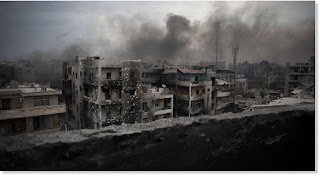Syria’s new ceasefire hailed, uncertainties remain
A new cease-fire agreement reached between the Syrian government and the opposition were welcomed by related parties on Thursday, but at the same time uncertainties remain over whether the truce will definitely end the nearly six-year-old civil war.
The chronic conflicts in Syria have killed more than 300,000 people and displaced nearly 11 million others.
NEW CEASE-FIRE
The new cease-fire went into force at midnight Thursday as declared by the Syrian army.
The nationwide truce was brokered by Russia and Turkey and agreed upon by the Syrian government and major opposition and rebel groups, while terrorist organizations such as the al-Qaida-linked Nusra Front and the Islamic State (IS), were excluded.
At a meeting with Defense Minister Sergei Shoigu and Foreign Minister Sergei Lavrov, Russian President Vladimir Putin said Thursday that the trilateral format involving Russia, Turkey and Iran will monitor and provide guarantees to the peace process. Contacts between him and leaders of Turkey, Iran and Syria would coordinate further steps on Syrian agreements, he added.
Putin, however, said the cease-fire agreement was quite fragile and required special attention and patience.
The previous two Syria cease-fires brokered by Russia and the United States took effect in February and September respectively but both collapsed within weeks as warring sides accused each other of truce violations.
This time, although warring sides appeared to have stopped firing in many areas, monitors still reported clashes between government forces and insurgents along the provincial boundary between Idlib and Hama, and isolated incidents of gunfire further south less than two hours after the truce began, according to a Reuters report.
WELCOMED BY RELATED PARTIES
Syrian President Bashar al-Assad promised Thursday to honor the newly clinched cease-fire agreement in a phone conversation with Putin, according to the Kremlin.
Syrian Foreign Minister Walid al-Moallem said Thursday evening that the cease-fire constitutes a “real chance” to establish a political settlement in Syria.
He noted that the new cease-fire is distinct from the previous failing ones due to the “strong Russian guarantees,” saying that Russia is a partner in fighting terrorism, and that Russia has guaranteed that “every breach will be confronted.”
The Syrian army said in a statement that the cease-fire paves the way for reactivating negotiations to end the conflict.
The Turkey-backed Free Syrian Army and the Syrian National Coalition, a political coalition of Syrian opposition groups, have announced to honor the cease-fire.
Turkish President Recep Tayyip Erdogan described the agreement as a “historic opportunity” to end the Syrian conflict.
Turkey, a longtime backer of the Syrian opposition, has been allowing opposition forces to use its long border with Syria to cross back and forth.
The United States, which was not involved in recent truce negotiations, said the news of the cease-fire was positive.
“We hope it will be implemented fully and respected by all parties,” said U.S. State Department spokesman Mark Toner.
UN special envoy for Syria Staffan de Mistura said Thursday that a comprehensive cessation of hostilities remains a “cornerstone” for the peace process in the war-torn country.
UNCERTAINTIES REMAIN
Osama Donora, a political analyst, told Xinhua that the cease-fire comes as a result of the victories of the Syrian army, particularly in Aleppo in northern Syria, as the entire city has fallen back under government control.
Another reason, Donora said, is the Russian-Iranian effort to push Ankara to reach common ground with the two countries.
“The new agreement means that Turkey is now onboard with Russia, and its pledge to guarantee the implementation of the cease-fire on the rebel side is a positive thing,” said Donora. “This means that the main obstacle that was hindering the political settlement to Syria’s crisis has been largely surmounted.”
Vitaly Naumkin, director of the Oriental Studies Institute under the Russian Academy of Sciences, said the cease-fire agreement was reached because of cooperation between Russia and Turkey but that does not mean the Russia-Iran-Turkey trilateral format would replace Russia’s negotiations at the United Nations or the Russia-U.S. coordination.
Lavrov, the Russian foreign minister, said U.S. President-elect Donald Trump’s administration will be welcome to join the peace process once he takes office.
Vladimir Sazhin, a research fellow with the Oriental Studies Institute under the Russian Academy of Sciences, however, was not optimistic about the prospects for the cease-fire.
Russia, Turkey and Iran have their own interests, Sazhin said, adding that none of them will abandon their interests and the deep contradictions between Turkey and Iran and between Russia and Turkey will not disappear. Enditem




Comments
Post a Comment